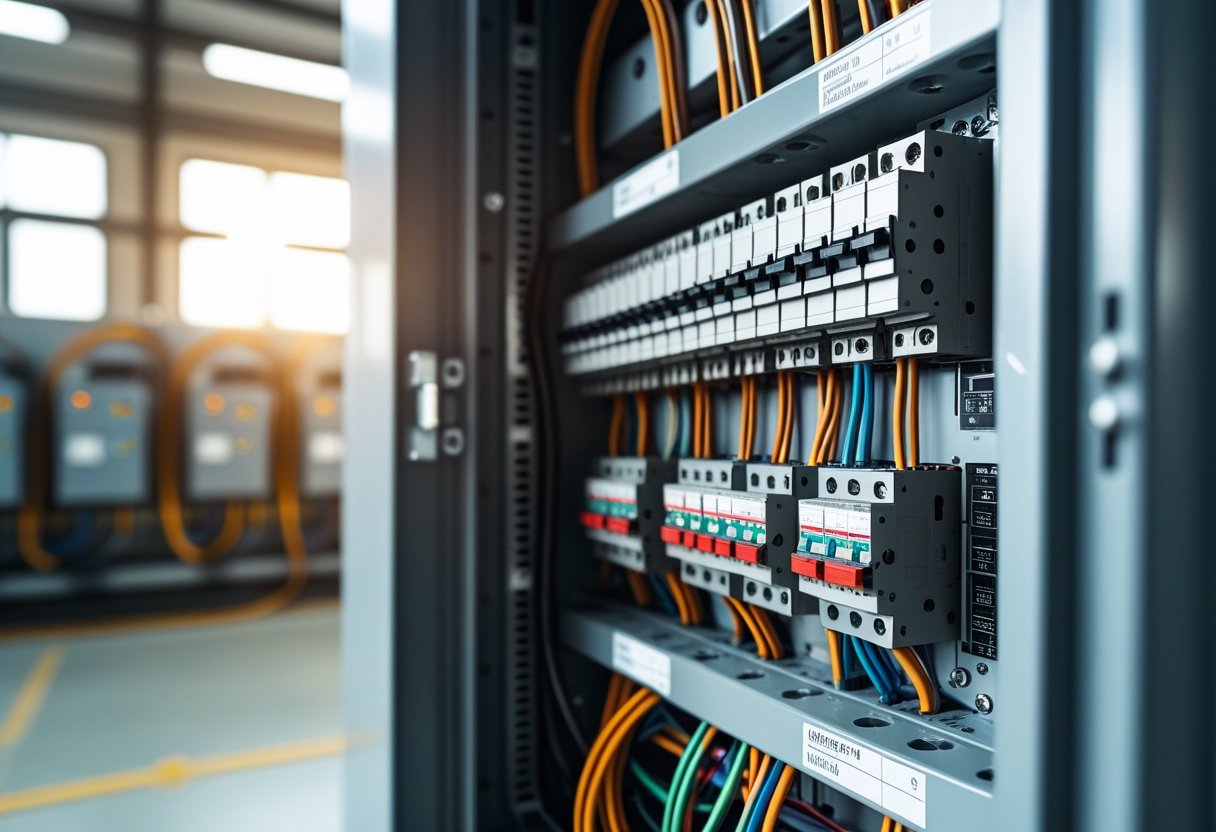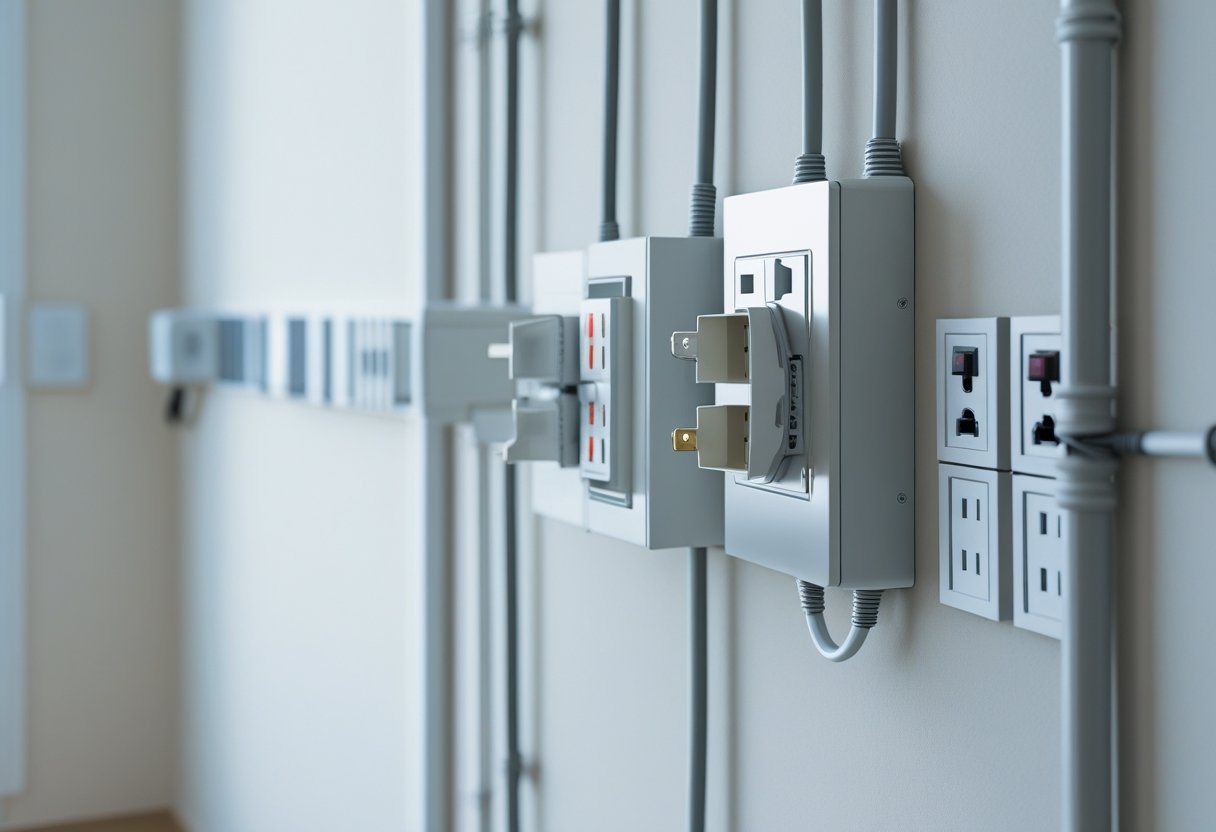When it comes to electrical safety, understanding and adhering to key rules can prevent serious accidents and protect your loved ones. The most important rule of electrical safety is to never work on electrical circuits unless the power is completely disconnected. This fundamental practice serves as the foundation for all safe electrical work, ensuring you minimize the risk of electric shock or fire.
At AAA Electrical Services, we prioritize your family's safety by offering expert guidance on electrical practices. Whether you're performing routine maintenance or planning a new installation, knowing how to safely handle electrical systems is crucial. You can feel confident about the integrity of your home's electrical work by following established safety protocols.
From circuit breaker repairs to EV charger installations, remember that safety-first principles should guide every electrical task. As a trusted provider in Sacramento and surrounding areas, AAA Electrical Services is dedicated to keeping your home safe while delivering quality repairs and installations with a focus on your peace of mind.
Understanding The Most Important Rule of Electrical Safety
Electrical safety is vital for preventing accidents and ensuring a secure working environment. The central focus is the practice of always de-energizing circuits before engaging in any electrical work, which minimizes risks such as electrical shock.
Defining Electrical Safety
Electrical safety encompasses the procedures and practices that aim to prevent harm due to electrical hazards. These include risks of electric shock, burns, or fire caused by faulty wiring and equipment. Electrical systems can pose significant dangers if not handled correctly, making awareness crucial.
Understanding electrical safety means recognizing the importance of being cautious around live wires, overloaded circuits, and faulty devices. Proper training is essential for anyone working with electricity, ensuring that you can identify and mitigate potential hazards. This knowledge empowers you to maintain a safe environment in your home or workplace.
The Core Principle: Always De-Energize Before Working
Always de-energizing circuits is the most critical rule to follow. Before starting any work, ensure that power is turned off at the circuit breaker. This simple step can significantly reduce the risk of electrical shock and injuries.
While it's vital to wear protective gear, de-energizing creates a safer work environment. Additionally, consider labeling circuits for easy identification and implementing lockout/tagout procedures to prevent accidental re-energization. At AAA Electrical Services, our trained technicians prioritize this rule to guarantee your safety.
Doing so allows you to work confidently, knowing that you are taking the necessary precautions. By following this core principle, you can protect yourself, your family, and your property effectively.
Hazards Associated With Electricity
Electrical systems and appliances pose various hazards that can lead to serious accidents if not handled properly. Understanding these risks is essential for maintaining safety at home or in the workplace.
Common Causes of Electrical Accidents
Electrical accidents often arise from a few critical factors. Contact with live wires is common, especially in non-insulated or damaged equipment. Improper use of extension cords can also lead to overloads and fires. Wet conditions significantly increase the risk of electrical shock, as water conducts electricity.
Inadequate training and unlicensed work further heighten the danger, exposing individuals to hazards they might not recognize. For instance, neglecting to turn off circuit breakers before working on electrical systems can result in serious injury or even death. At AAA Electrical Services, we emphasize the importance of proper safety protocols to prevent these occurrences.
Potential Consequences of Neglect
Neglecting electrical safety can have severe consequences. Electrical shock is one of the most immediate risks, which may cause burns, nervous system damage, or even fatal injuries. Beyond shock, electrical faults can lead to fires, often caused by overheating circuits or equipment.
Long-term neglect can result in costly repairs, such as damage to appliances or whole electrical systems, leading to increased energy bills. Furthermore, insurance claims related to electrical accidents can be complex and may not cover all damages. By prioritizing safety, you can help avoid these dire outcomes and ensure a secure environment for your family. When you choose services from AAA Electrical Services, you can trust our commitment to safety with every project.
Safe Work Practices And Procedures
Implementing effective safety practices and procedures is essential when working with electrical systems. By focusing on assessments, lockout/tagout methods, and collaboration with skilled personnel, you can significantly reduce electrical hazards.
Pre-Job Assessments
Before starting any electrical work, it's crucial to conduct a thorough pre-job assessment. This includes evaluating the work environment for potential hazards such as moisture, clutter, or damaged equipment.
Make a checklist to ensure that all necessary tools and protective gear are available. Consider any unique factors specific to your project, like the presence of high-voltage lines or nearby energized equipment.
Identifying risks helps in strategizing and mitigating hazards before beginning the job. This practice not only ensures your safety but also aligns with AAA Electrical Services' commitment to a family-safety-first approach.
Lockout/Tagout Procedures
Lockout/tagout (LOTO) procedures are vital for protecting workers from accidental energization of equipment during maintenance or repairs. Before commencing work, ensure that the power source is completely de-energized.
Attach lockout devices to circuit breakers, switches, or valves, and place tags that clearly indicate that work is in progress. This informs others not to restore power while the work is ongoing.
Regular training on LOTO procedures reinforces the importance of these safety measures. When you adhere strictly to these protocols, you enhance safety not just for yourself but also for your coworkers on the job site.
Working With Qualified Personnel
When tackling electrical projects, it's essential to work with qualified personnel. Not only does this ensure compliance with safety regulations, but it also promotes a safer work environment.
Always hire technicians who are licensed and background-checked, like those from AAA Electrical Services. Such professionals are trained to handle complex electrical systems and can identify hazards that may not be apparent to untrained individuals.
Collaboration with skilled personnel allows for a more efficient workflow and minimizes risks. Their expertise ensures that tasks are completed accurately and safely, providing peace of mind for you and your family.
Proper Use And Inspection Of Electrical Tools And Equipment
Using and inspecting electrical tools correctly is vital for safety. Choosing the right tools and maintaining them properly can help prevent accidents and ensure efficient operation.
Choosing The Right Electrical Tools
Selecting appropriate electrical tools is the first step toward safe usage. Ensure your tools are designed for the specific task at hand. Look for tools that are well-reviewed and meet safety standards.
Consider the weight and grip of the tools as well. A comfortable grip can prevent accidents, especially during prolonged use.
Using quality extension cords and power cords is essential. Verify they are rated for your intended load to avoid overheating or tripping hazards. If you're unsure about the right products, consult with professionals at AAA Electrical Services, who can guide you in making the best choices for your projects.
Inspecting And Maintaining Tools
Regular inspection of electrical tools ensures they remain safe to use. Check power cords and extension cords for signs of wear or damage, such as fraying or exposed wires. Replace any damaged cords immediately to avoid shock or fire risks.
Before each use, conduct a visual inspection of your tools. Look for cracks or defects that could compromise safety during operation. Keep tools clean and stored properly to prolong their lifespan.
If you notice any issues, address them immediately. AAA Electrical Services can help with repairs, ensuring your equipment is in optimal condition. Regular maintenance contributes to safer home and work environments.
Handling Power Cords And Extension Cords Safely
Proper handling of power cords and extension cords is crucial for maintaining safety in your home. Following specific guidelines will help prevent hazards and ensure effective use.
Preventing Overloads And Damage
To avoid overheating or damaging your cords, never exceed the recommended wattage. Check the cord's rating and ensure that the devices you connect do not pull more power than what the cord can handle.
Additionally, keep cords away from water, snow, or extreme heat. This is vital for preventing electrical shorts and maintaining the integrity of the insulation.
When using extension cords, avoid daisy chaining multiple cords together. This practice can lead to serious hazards and defeats the purpose of using them safely. Always store unused cords properly and unplug them when not in use. For detailed guidelines on extension cord safety, visit Extension Cord Safety Tips.
Storing Cords Correctly
Proper storage of your power and extension cords can extend their lifespan and keep your home safe. When rolling up cords, avoid tight coils. Instead, use loose loops to prevent damage to the internal wiring.
Keep cords in a cool, dry place away from direct sunlight. This protects them from deterioration and maintains their functionality. Use cord organizers or reel systems to manage longer cords, which can also prevent tangling and accidental damage.
Labeling cords by their intended use can make it easier to locate the right one when needed. If you're ever in doubt about how to handle or store your electrical cords, reach out to professionals like AAA Electrical Services for expert advice tailored to your family's safety.
Frequently Asked Questions
Understanding electrical safety can help you protect yourself and your home. Addressing common questions can clarify important rules and practices to ensure safety while working with electricity.
What are the top five rules for electrical safety?
- Always turn off the power before working on electrical circuits.
- Use insulated tools and wear appropriate personal protective equipment (PPE).
- Never overload outlets or use damaged cords.
- Keep water away from electrical equipment.
- Have GFI outlets installed in areas prone to moisture.
Can you list the 10 Golden Rules of electrical safety?
- Isolate power before working.
- Use proper tools and equipment.
- Wear PPE at all times.
- Check for hazards in the workspace.
- Avoid wet areas.
- Ensure adequate ventilation.
- Do not work alone when handling high voltage.
- Regularly inspect tools and equipment.
- Provide proper training for all personnel.
- Follow local electrical codes and standards.
How do you ensure safety when working with electricity?
To ensure safety, always de-energize circuits before beginning work. Utilizing insulated tools and wearing protective gear is crucial. Additionally, maintain a clutter-free workspace to avoid hazards and distractions.
What guidelines should be followed to prevent electrical accidents?
Conduct regular inspections of electrical systems and equipment. Always use equipment as intended and be mindful of wet conditions. Installing surge protectors can also help safeguard against unexpected power surges.
Why is it important to follow electrical safety protocols?
Following electrical safety protocols minimizes the risks of accidents and injuries. Adhering to safe practices safeguards not only your life but also your family and home. Professionals like AAA Electrical Services emphasize these protocols to ensure peace of mind for homeowners.
How does proper electrical safety protect against electrical fires?
Proper electrical safety reduces the likelihood of short circuits and overloaded circuits, common causes of electrical fires. Regular maintenance and inspections help identify potential risks early, allowing for timely repairs to avoid dangerous situations.






.png)